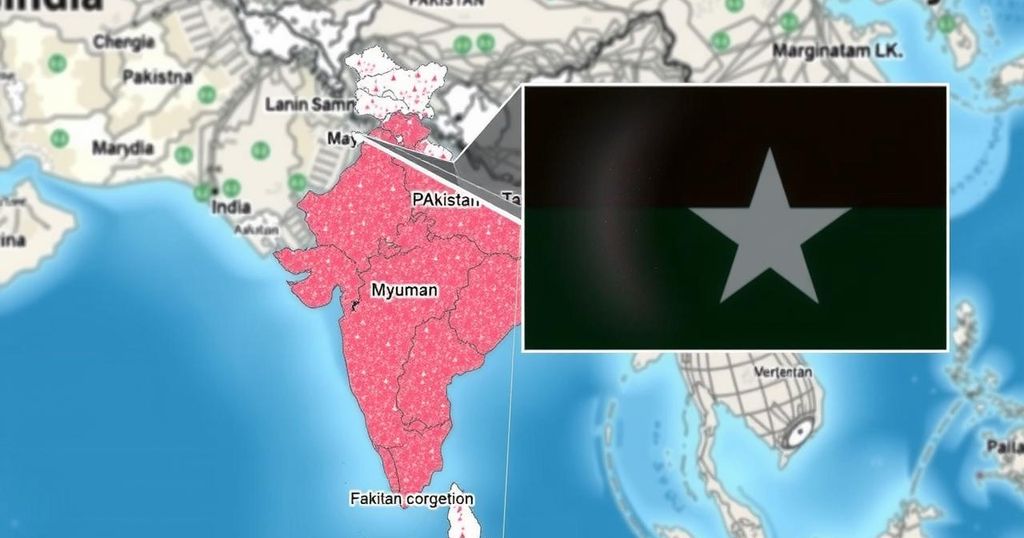Rising GPS Spoofing Threatens Aviation Safety Near India’s Borders
GPS interference, especially spoofing, is on the rise near India’s borders with Pakistan and Myanmar, raising significant safety concerns in aviation. Reports indicate daily incidents affecting navigation accuracy, prompting the Directorate General of Civil Aviation to require airlines to improve reporting and procedural responses. Recent occurrences highlight vulnerabilities in flight operations, stressing the need for enhanced measures to safeguard air travel amidst these challenges.
Instances of GPS interference, particularly spoofing, are increasingly reported in conflict zones globally, including near India’s borders with Pakistan and Myanmar. According to OPSGROUP, a collective of over 8,000 aviation professionals, these regions rank among the highest for navigation inaccuracies. GPSjam data indicates that over 10% of aircraft experienced low navigation accuracy in these locations. Spoofing misleads navigation systems using false GPS signals and poses risks, particularly in modern warfare with the use of drones. A recent incident involving an Embraer jet highlights this threat, as it was reportedly affected by GPS interference prior to a tragic crash that resulted in numerous fatalities.
OPSGROUP’s September 2024 report identified the emergence of GPS spoofing since September 2023, with more occurrences noted in various regions, including the Black Sea, western Ukraine, and the India-Pakistan border. Dramatic increases in spoofing reports were documented, with daily incidents rising from 300 to 1,500 globally within a span of just several months. Specifically, the Delhi Flight Information Region has seen daily spoofing events since May 2024, affecting 316 aircraft over a one-month period.
In light of these developments, the Directorate General of Civil Aviation (DGCA) of India has urged airlines to establish standard procedures and to report spoofing incidents every two months, despite this data remaining undisclosed to the public. Pilots have reported experiencing significant GPS interference, particularly during flights from the northern regions of India to destinations like Amritsar and various Gulf countries.
Despite the aircraft’s redundant systems, which utilize an Inertial Reference System for navigation, pilots still experience challenges posed by GPS spoofing. The phenomenon can lead to misleading speed displays and potentially erroneous altitude warnings. While cockpit alerts are not typically issued during such events, flight crew can discern anomalies through inconsistent data displays on navigation instruments.
Furthermore, the United Nations International Civil Aviation Organization (ICAO) has recently expressed significant concern regarding the increase in harmful GNSS interference at its 14th Air Navigation Conference, urging states to communicate military-related GNSS interference activities to aviation authorities and navigation service providers whenever feasible.
GPS interference, particularly in the form of spoofing, has become a critical issue affecting aviation safety, especially in conflict-zones worldwide. These disruptions can stem from military activities or cyber attacks, leading to compromised navigation for aircraft. Given the reliance on GPS for modern flight operations, these incidents pose serious risks to the safety and accuracy of commercial air travel. The aviation community is increasingly concerned, as recent data indicate a surge in both the frequency and geographical scope of GPS spoofing events, particularly near contentious borders such as those between India and its neighbors.
In conclusion, the increase in GPS interference events, particularly in the form of spoofing near India’s borders with Pakistan and Myanmar, poses a grave threat to aviation safety. The rise in reports from OPSGROUP and the response of the DGCA indicate a need for immediate action and oversight in addressing this alarming trend. The aviation industry and regulatory bodies must collaborate to enhance reporting mechanisms and ensure the safety of air travel as GPS spoofing continues to challenge navigational accuracy globally.
Original Source: www.thehindu.com








Post Comment